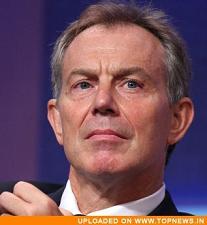Tony Blair: “True Friend” of Ukraine: Tapped by Poroshenko to Join Kiev Advisory Council

Ukrainian President Petro Poroshenko has invited former British PM Tony Blair to “share his experience of public administration” on an international council of European public figures advising Kiev on government reforms.
After meeting with Poroshenko in Kiev, the former UK leader told reporters that Ukraine faced “great challenges” from “Russian aggression” and “corruption.” Blair, who was prime minister from 1997 to 2007, also called on Ukrainian leaders to follow “not self-interest but values” such as “freedom, democracy and a desire to serve the people.”
Обговорив з Тоні Блером досвід реформ та держ. управління.Незважаючи на війну, ми маємо можливість проводити реформи! pic.twitter.com/aAUfgNDaOt
— Петро Порошенко (@poroshenko) June 17, 2015
Poroshenko boasted that “despite the war, we are carrying out reforms,” and said that Blair asked him “exactly what help was needed from the international community.”
“This is the approach of a true friend of Ukraine,” said Poroshenko, who was elected in June 2014 in a controversial poll boycotted by rebellious regions in Eastern Ukraine.
Ukraine’s International Advisory Council for Reforms started working last month. Leading it is former Georgian President Mikheil Saakashvili, who has since been appointed governor of the Odessa Region, in the south of the country. In Georgia, Saakashvili is wanted for crimes related to embezzlement during his time in office.
Other members of the body, which has no executive or legislative powers, include former Swedish foreign minister Carl Bildt, Slovak reformer Mikulas Dzurinda and economist Anders Aslund. US Senator John McCain, a prominent supporter of the 2014 Maidan coup that deposed former Ukrainian President Viktor Yanukovich, said he was forced to decline a seat on the council, due to US Congress regulations.
Blair did not comment on whether he would accept Poroshenko’s offer.
Blair’s decade in office is mostly remembered internationally for his joint effort with then-US President George W Bush to invade Iraq in 2003. The justification for the invasion trumpeted up by the two governments – alleged possession of weapons of mass destruction – proved to be false, and the evidence for it greatly exaggerated.
Since his resignation in 2007, Blair has built a lucrative international business empire, advising numerous governments and corporations around the world as well as giving lectures, allegedly receiving as much as £6,000 pounds per minute in fees.
Until May this year, he also served as the UN Middle East Quartet’s special envoy tasked with tackling the conflict between Israelis and Palestinians. Critics say his achievements were negligible, with alleged conflicts of interests and his close ties to the Israeli government hampering his performance.

